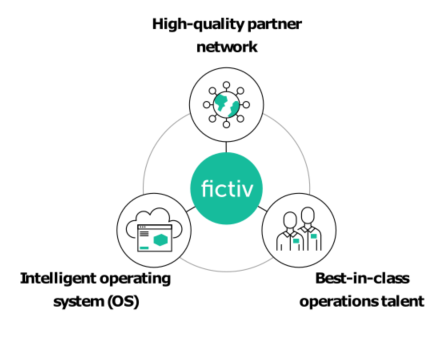Time to read: 6 min
If you are to the point in the design process where you can begin conversations with potential suppliers, congratulations! Ideally, you will begin this conversation sooner rather than later so you can get critical design for manufacturability (DFM) feedback, and reduce the number of design iterations required. But finding a supplier who can turn your design into a product isn’t always easy. And sourcing parts can be daunting and SLOW — you’ll probably face delayed responses, difficulty getting quotes, exorbitant prices, or longer-than-desired lead times.
At Fictiv, “Sourcing Simplified” is our motto. Our intelligent platform, backed by our manufacturing experts, provides the ultimate sourcing solution. But if you want to do it yourself, here are some best practices for selecting the right suppliers.
Lead Time and Price

Lead time, price and quality are probably the most critical determining factors when choosing a supplier. First, let’s discuss the tradeoff amongst cost and lead time. Many have studied the correlation between lead time and cost, but there’s plenty of evidence that they’re inversely proportional. If you want a lower cost, you have to sacrifice quality. If you want a shorter lead time, you’re going to pay more.
In the past few years, technology has enabled instant access to alternative suppliers, supply chain, pricing, and lead time information, and digital supply chain management infrastructure. Due to the complexity of supply chain management and all of this data, several mathematical models have been developed to facilitate choosing suppliers, like this mathematical supply chain model published in the International Journal of Intelligent Control and Systems.
The bottom line is that digital supply chains are agile, resilient, accessible, and sustainable. Digital supply chains layer on data not traditionally available to drive decisions in supply chains, enabling supply chains with faster lead times, higher quality, and less waste.
Look Close to Home and Far Away: Location, Location, Location
When selecting a supplier to perform a manufacturing process, you may be tempted to look for vendors in close proximity. But there are many benefits to geographically diversifying your supply chain. Namely, when issues arise in one area, you can pivot sourcing to non-disrupted areas. In addition, with a global sourcing strategy, you can obtain the optimal balance between cost, risk mitigation, and lead time.
Pro-tip: Fictiv’s Digital Manufacturing Ecosystem connects you with the best suppliers around the globe, enabling true manufacturing agility.
Review Capabilities
Whether you’re looking for 3D printing, metal casting, CNC machining, injection molding, laser cutting, forming, urethane casting, welding or even finishing, ensuring that a supplier can meet your production requirements is vital to sourcing success. This goes above and beyond visiting their capabilities page on their website or a quick phone call (although those are excellent first steps). Capacity must also be considered, along with capability. If you’re a small company set up to grow, it’s wise to choose a supplier with a larger percentage of available capacity.
Pro-tip: If you aren’t sure which manufacturing process will suit your requirements the best, working with a supplier who can provide guided expertise is critical to accelerating time to market.

Ideally, you should either audit the supplier or review the results of a third-party audit of the company’s quality management system. You should also order a sample of their work — whether it’s a single prototype or a small lot of product. Samples should be scrutinized, and feedback should be provided to the prospective supplier to ensure you can obtain the results you’re looking for.
Another consideration is the supplier’s ability to provide multiple services. Sometimes, shipping products from location to location to during the production process is unavoidable to get the right finished product. But it’s beneficial when a supplier offers a multitude of manufacturing processes, because it reduces lead times and cost of production.
Pro-tip: Sometimes a supplier can perform more processes than are listed on their website, so it never hurts to ask!
Check Out Quality and Quality Certifications
Prior to evaluating a supplier for a product, you should double check your customer or end user requirements. Are there any quality certifications, such as ISO 9001, required by the part manufacturer? In 2022, many companies have quality certifications listed directly on their websites, but if not, you should request them as part of a supplier quality survey or other onboarding process. You should also carefully verify the scope of the potential supplier’s quality certification to ensure that it covers the specific services you require and the specific locations that will be manufacturing your products.
Additionally, your quality management system requirements for suppliers may require you to perform some type of supplier quality evaluation. The type and extent of this evaluation may vary: depending on the industry you are in, the part’s use case, the control your company requires to be applied to the product’s manufacturing, and any applicable regulatory or statutory requirements.
When evaluating whether or not a supplier’s quality management system is up to par, you should ask for (or require) proof of compliance to the following:
- Does the supplier have a continuous improvement culture where they identify and resolve gaps in production, quality, etc?
- Does the supplier have a process to ensure they can meet requirements for your products and services (contract review)?
- Does the supplier have a contingency plan for when a requirement for a product or service provision cannot be met (a nonconformance management process)?
- Does the supplier utilize data obtained from manufacturing and/or customer satisfaction to improve their processes?
- Does the supplier have a clearly defined company strategy that has some interaction with their partners and customers (interested parties)?
- What is their quality inspection process like? Do they provide feedback to customers and do they have a method for quickly resolving issues?
While the above is not an exhaustive list, it provides a good starting point for determining if a supplier has a good quality management system. The goal is to ensure your products will be manufactured per your specifications and that any issues will be addressed in a correct and timely manner.
Consider Business Strategy/Strategic Alignment
Does the prospective supplier’s core capabilities align with your core needs and give you the opportunity to align with them as a manufacturing partner, not just a supplier? The goal should always be to develop a strategic partnership with an eye to the future. This is especially important when considering CNC machining suppliers and other partners who can perform work for your business for years to come.
Here’s how Fictiv’s Vice President of Core Operations, Andy Sherman, puts it: “There are plenty of checkboxes when qualifying a new supplier: Do they have the manufacturing and value-add capabilities you’re looking for? Do they have the proper quality management systems in place to consistently conform to your requirements? Do they have the capacity to meet your forecasted demand?”
“For them to truly be a strategic manufacturing partner, not just a transactional supplier, they should work closely with you to meet your and your customers’ needs — even when things go wrong. You need to first establish a relationship with the supplier and validate that the supplier’s core competencies and business objectives align with your business needs. This is the bedrock of healthy supply chain partnerships. Because when things go wrong, quickly resolving those issues is a priority and your partner will make the investments to avoid them from recurring.”
Sourcing Simplified – Start Your Next Project With Fictiv

Fictiv is your operating system for custom manufacturing that makes part procurement faster, easier, and more efficient. In other words, Fictiv lets engineers, like you, engineer instead of sourcing, vetting, onboarding and managing suppliers.
With Fictiv, thousands of companies have streamlined their custom part sourcing workflows, unlocking capacity for product innovation and transforming how the next generation of products are designed, developed, and delivered. Create an account and upload your part to see what our instant quote process, design for manufacturability feedback, and intelligent platform can do for you.








